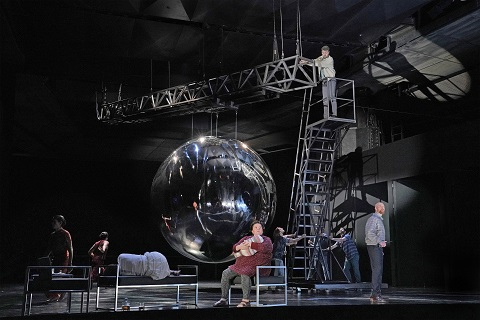
03 Aug 2018
Santa Fe: Atomic Doesn’t Quite Ignite
What more could we want than having Peter Sellars re-imagine his acclaimed staging of John Adams’ Doctor Atomic at the renowned Santa Fe Opera festival?
English Touring Opera are delighted to announce a season of lyric monodramas to tour nationally from October to December. The season features music for solo singer and piano by Argento, Britten, Tippett and Shostakovich with a bold and inventive approach to making opera during social distancing.
This tenth of ten Live from London concerts was in fact a recorded live performance from California. It was no less enjoyable for that, and it was also uplifting to learn that this wasn’t in fact the ‘last’ LfL event that we will be able to enjoy, courtesy of VOCES8 and their fellow vocal ensembles (more below …).
Ever since Wigmore Hall announced their superb series of autumn concerts, all streamed live and available free of charge, I’d been looking forward to this song recital by Ian Bostridge and Imogen Cooper.
The Sixteen continues its exploration of Henry Purcell’s Welcome Songs for Charles II. As with Robert King’s pioneering Purcell series begun over thirty years ago for Hyperion, Harry Christophers is recording two Welcome Songs per disc.
Although Stile Antico’s programme article for their Live from London recital introduced their selection from the many treasures of the English Renaissance in the context of the theological debates and upheavals of the Tudor and Elizabethan years, their performance was more evocative of private chamber music than of public liturgy.
In February this year, Albanian soprano Ermonela Jaho made a highly lauded debut recital at Wigmore Hall - a concert which both celebrated Opera Rara’s 50th anniversary and honoured the career of the Italian soprano Rosina Storchio (1872-1945), the star of verismo who created the title roles in Leoncavallo’s La bohème and Zazà, Mascagni’s Lodoletta and Puccini’s Madama Butterfly.
Evidently, face masks don’t stifle appreciative “Bravo!”s. And, reducing audience numbers doesn’t lower the volume of such acclamations. For, the audience at Wigmore Hall gave soprano Elizabeth Llewellyn and pianist Simon Lepper a greatly deserved warm reception and hearty response following this lunchtime recital of late-Romantic song.
Collapsology. Or, perhaps we should use the French word ‘Collapsologie’ because this is a transdisciplinary idea pretty much advocated by a series of French theorists - and apparently, mostly French theorists. It in essence focuses on the imminent collapse of modern society and all its layers - a series of escalating crises on a global scale: environmental, economic, geopolitical, governmental; the list is extensive.
For this week’s Live from London vocal recital we moved from the home of VOCES8, St Anne and St Agnes in the City of London, to Kings Place, where The Sixteen - who have been associate artists at the venue for some time - presented a programme of music and words bound together by the theme of ‘reflection’.
'Such is your divine Disposation that both you excellently understand, and royally entertaine the Exercise of Musicke.’
Amongst an avalanche of new Mahler recordings appearing at the moment (Das Lied von der Erde seems to be the most favoured, with three) this 1991 Mahler Second from the 2nd Kassel MahlerFest is one of the more interesting releases.
‘And there was war in heaven: Michael and his angels fought against the dragon; and the dragon fought and his angels, And prevailed not; neither was their place found any more in heaven … that old serpent … Satan, which deceiveth the whole world: he was cast out into the earth, and his angels were cast out with him.’
If there is one myth, it seems believed by some people today, that probably needs shattering it is that post-war recordings or performances of Wagner operas were always of exceptional quality. This 1949 Hamburg Tristan und Isolde is one of those recordings - though quite who is to blame for its many problems takes quite some unearthing.
There was never any doubt that the fifth of the twelve Met Stars Live in Concert broadcasts was going to be a palpably intense and vivid event, as well as a musically stunning and theatrically enervating experience.
‘Love’ was the theme for this Live from London performance by Apollo5. Given the complexity and diversity of that human emotion, and Apollo5’s reputation for versatility and diverse repertoire, ranging from Renaissance choral music to jazz, from contemporary classical works to popular song, it was no surprise that their programme spanned 500 years and several musical styles.
The Academy of St Martin in the Fields have titled their autumn series of eight concerts - which are taking place at 5pm and 7.30pm on two Saturdays each month at their home venue in Trafalgar Square, and being filmed for streaming the following Thursday - ‘re:connect’.
The London Symphony Orchestra opened their Autumn 2020 season with a homage to Oliver Knussen, who died at the age of 66 in July 2018. The programme traced a national musical lineage through the twentieth century, from Britten to Knussen, on to Mark-Anthony Turnage, and entwining the LSO and Rattle too.
With the Live from London digital vocal festival entering the second half of the series, the festival’s host, VOCES8, returned to their home at St Annes and St Agnes in the City of London to present a sequence of ‘Choral Dances’ - vocal music inspired by dance, embracing diverse genres from the Renaissance madrigal to swing jazz.
Just a few unison string wriggles from the opening of Mozart’s overture to Le nozze di Figaro are enough to make any opera-lover perch on the edge of their seat, in excited anticipation of the drama in music to come, so there could be no other curtain-raiser for this Gala Concert at the Royal Opera House, the latest instalment from ‘their House’ to ‘our houses’.
"Before the ending of the day, creator of all things, we pray that, with your accustomed mercy, you may watch over us."

What more could we want than having Peter Sellars re-imagine his acclaimed staging of John Adams’ Doctor Atomic at the renowned Santa Fe Opera festival?
Well for starters, could we please have the original production back? Or another version that manages to convey the menace and import of this disturbingly contemporary peril? The SFO team of collaborators promised much, delivered a good deal, but fell short of this important work’s shattering impact.
I am a great admirer of baritone Ryan McKinny. When he is ideally cast, I have heard him as a thrilling Dutchman or full-throated Jochanaan. The role of Dr. J. Robert Oppenheimer sadly does not play to his gifts. While Mr. McKinny was always engaged and highly musical, his handsome instrument just doesn’t have the easy, ringing top needed to succeed completely in the role. Ryan worked hard, earned my admiration, and always displayed the highest professional standards, but ultimately could not anchor the production as Oppenheimer should.
Conversely, Daniel Okulitch was in splendid, refulgent voice as General Leslie Groves, indeed I have never heard him sing better. The macho snarl in his cogent delivery made a powerful impression. Mr. Okulitch, too, was curiously miscast. The General is meant to be portly, indeed there is a lengthy, humorous “cake “ section about his having to watch his weight and diet. That makes little sense when the lean, handsome actor has made previous SFO shirtless appearances that had patrons scrambling for their binoculars.
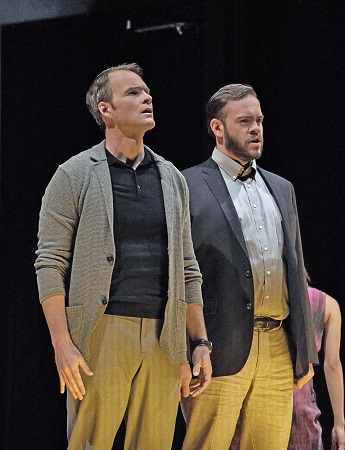 Ryan McKinny (Robert Oppenheimer) and Andrew Harris (Edward Teller). Photo credit: Ken Howard for Santa Fe Opera 2018.
Ryan McKinny (Robert Oppenheimer) and Andrew Harris (Edward Teller). Photo credit: Ken Howard for Santa Fe Opera 2018.
Andrew Harris’ characterful, measured bass was a good fit for physicist Edward Teller. Meteorologist Frank Hubbard was exceedingly well served by Tim Mix’s steady, powerful baritone. Apprentice tenor Mackenzie Gotcher performed with distinction as Army Captain James Nolan. The always reliable, sweet voiced, stylish tenor of Benjamin Bliss (Robert Wilson) on this night sounded veiled on top. I think this may be the result of the Adams-mandated miking.
It is hard to judge opera singers’ true accomplishment when a sound mixer is in between. Mssrs. Okulitch, Mix, and Harris were least impacted, while the other men sounded tinny (especially handicapping McKinny). Having seen the original twice, I was never “aware” of the amplification as I was here. There is no one in this capable cast that wouldn’t have fared better without it. Happily, the ladies were not so afflicted.
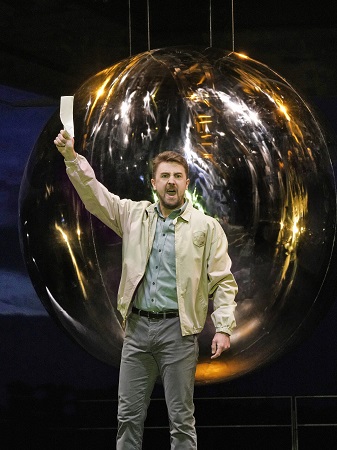 Ben Bliss (Robert Wilson). Photo credit: Ken Howard for Santa Fe Opera 2018.
Ben Bliss (Robert Wilson). Photo credit: Ken Howard for Santa Fe Opera 2018.
Julia Bullock was everything one could wish as she created a haunting, melancholy, determined Kitty Oppenheimer. Ms. Bullock’s shining, supple soprano is in complete service to creating a three-dimensional portrait of the hapless spouse. Her touching interpretation of “Am I in Your Light” was alone worth the trip. Her poignant legato phrases were matched in beauty by the urgent delivery of conversational passages. This was a triumphant role assumption by a young artist at the height of her powers and on the precipice of her stardom.
Meredith Arwady’s powerful, rich contralto always adds immeasurably to any show, and her secure reading of Pasqualita was no exception. Ms. Arwady left us wanting (much) more. The biggest star of the night might just have been the Young Apprentice opera chorus, meticulously groomed by chorus master Susanne Sheston. From the very first choral statements they served notice that they were here to make thrilling music, flawlessly articulated, and dramatically compelling. Their high caliber contribution would be welcomed at any opera house in the world.
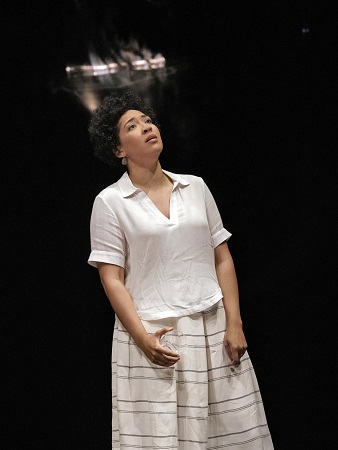 Julia Bullock (Kitty Oppenheimer). Photo credit: Ken Howard for Santa Fe Opera 2018.
Julia Bullock (Kitty Oppenheimer). Photo credit: Ken Howard for Santa Fe Opera 2018.
The overall musical effect was variable. Early on in the night, after the second or third unsteady passage occurred, I trained my eye on conductor Matthew Aucoin. His stick technique was not what I expected for a score demanding such precision, but rather consisted of a loop of bobbing and waving. The experienced instrumentalists seemed sometimes to be not so much playing together as clinging together. Maestro Aucoin has obvious enthusiasm for the piece, but I urge that it be wedded to more accuracy with the baton.
It has to be reported that throughout Act I a torrential, violent thunder and lightening storm eclipsed any drama to be found on the stage, and some string players had to retire momentarily to preserve their instruments. That did not help, but also did not cause the imprecision in the ensemble.
The storm also caused any number of unintentional (and hearty) laughs. After a particularly loud thunderclap, Oppenheimer’s next line was: “What if it’s a dud?” There is much tense discussion about the weather in the waning pages of Act I, since it will impact the test and the potential spread of radioactive fallout. The actors were thwarted in increasing the dramatic stakes by constant titters at dialogue about unfortunate weather. But truthfully, well before Mother Nature intruded, the dramatic progression was already dampened.
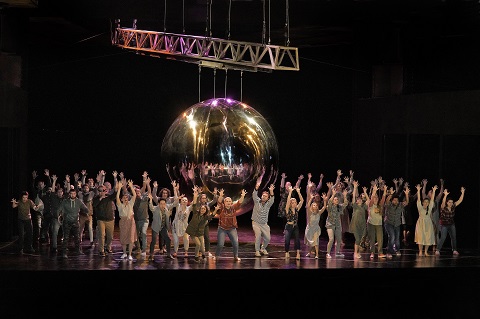 Santa Fe Chorus. Photo credit: Ken Howard for Santa Fe Opera 2018.
Santa Fe Chorus. Photo credit: Ken Howard for Santa Fe Opera 2018.
David Gropman’s well-intended set design is dominated by the omnipresent “bomb,” in the guise of a suspended silver, reflective globe (think: a really really oversized Christmas ornament). Selected industrial set pieces are added and subtracted beneath it, and the ball tracks up and back, but what you see is all you’re going to get. Since all is revealed up front, there is no impending visual impact, never any unsettling “tease” about what this thing looks like and what it does.
A plus side is that the surface takes light well, and designer James F. Ingalls has made good attempts to make it look menacing, or at least colorful. I wish Mr. Ingalls had gone further in isolating key dramatic moments, especially Oppenheimer’s anguished aria, “Batter My Heart” which inexplicably left the hero on a fully lit, un-atmospheric stage.
Gabriel Berry’s costumes were period, correct, and awfully plain in their palette. The dancers were more fancifully attired, although Emily Johnson’s choreography was a puzzle to me. I am fine with the gestures not telling a story, but shouldn’t they at least reflect the music? In a critical, troubling, angular, unsettling musical bridge, the corps remained resolutely gently undulating.
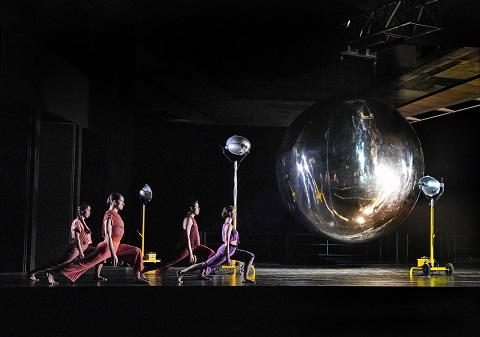 Dancers. Photo credit: Ken Howard for Santa Fe Opera 2018.
Dancers. Photo credit: Ken Howard for Santa Fe Opera 2018.
I am a fan of director Peter Sellars. He takes big risks and the result is often thrilling. But concepts that work brilliantly in one production, don’t always translate to another. The choral and solo gestures that he devised for Glyndebourne’s Theodora were illuminating and bewitching. The semaphoric gesturing in this Dr. Atomic bordered on being “Captioned for the Clinically Bewildered.” Mr. Sellars was at his best in the inter-relationships of the principals and the shifting choral formations, which almost made up for a good deal of distracting background filler of unmotivated crosses.
Whatever my reservations, I commend Santa Fe Opera for boldly scheduling such a difficult, important work this summer, for so diligently resourcing it, and for making it available for new audiences to partake of its glories.
James Sohre
John Adams: Doctor Atomic
Dr. J. Robert Oppenheimer: Ryan McKinny; Edward Teller: Andrew Harris; Robert Wilson: Benjamin Bliss; Kitty Oppenheimer: Julia Bullock; Pasqualita: Meredith Arwady; General Leslie Groves: Daniel Okulitch; Frank Hubbard: Tim Mix; Captain James Nolan: Mackenzie Gotcher; Conductor: Matthew Aucoin; Director: Peter Sellars; Set Design: David Gropman; Costume Design: Gabriel Berry; Lighting Design: James F. Ingalls; Sound Design: Mark Grey, Daniel Gower; Choreography: Emily Johnson; Chorus Master: Susanne Sheston